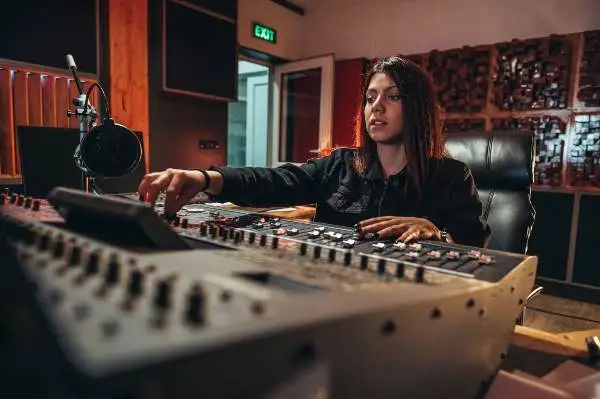The music industry often appears glamorous and exciting from the outside, drawing many to dream of a career among the stars. Yet, achieving a successful and lasting career in music demands hard work and dedication. It's not just about talent, it requires continuous networking, practicing, and often managing multiple projects at once.
Despite these challenges, the industry is rich with diverse opportunities beyond just performing on stage. From sound engineering and producing to marketing and managing artists, there are numerous roles for those willing to put in the effort.
In this article, we'll explore these opportunities, providing a realistic view of what it takes to make it in the music business. Whether you aim to be on stage or behind the scenes, getting a grip on the landscape and what's available are your first steps toward a successful career in the music business.
Music Industry Job Opportunities
When most people think about a career in music, the first role that comes to mind is usually being a performer. However, the industry is much more varied than just the spotlight on stage.
Today, technology plays a pivotal role in how music is created, distributed, and consumed. This digital shift has led to the creation of jobs that didn't exist a decade ago.
While we've always had audio engineering, which involves the technical aspects of sound in recording sessions, and music production, where you bring a song to life in the studio, you have opportunities to look into digital marketing and data analytics roles, strategizing releases or understanding listener trends.
Let's take a look at some of the most popular music careers.
Artist, Music Producer, Audio Engineer

If you have a passion for music creation but prefer the magic that happens behind the scenes, roles like audio engineering and music production might be your calling.
Audio engineers focus on the technical aspects of sound during live performances and recording sessions, ensuring that the audio quality is top-notch. Think recording, mixing, and mastering engineers.
Music producers , on the other hand, are often seen as the creative forces behind a project, guiding the artistic direction of music recordings and sometimes even influencing the songwriting process.
While these roles do differ from a traditional standpoint, they frequently overlap. A deep understanding of sound is crucial for both, and both positions often collaborate closely to achieve the best possible tracks in professional settings.
If you're looking to break into these fields, internships at recording studios are a tried-and-true entry point. These positions offer invaluable hands-on experience and a chance to network with industry professionals. Building relationships can open doors to future opportunities, making every session a chance to impress and advance.
Another avenue for budding audio engineers and producers is to market their services online . Platforms like Fiverr or SoundBetter allow you to connect with artists globally who may need your expertise. Alternatively, you can network with the local music scene and try and get projects with local artists to build a portfolio and gain practical experience.
Of course, if performing is your passion, pursuing a career as an artist and going on tours is a viable path. Many musicians find success and fulfillment by performing live, selling merchandise, and offering exclusive content to fans through platforms like Patreon.
If you're an artist or music maker, I'd also recommend creating music specifically for media such as TV shows, commercials, and video games, which is known as sync licensing. It's a growing field that can be quite lucrative if you get good placements.
This path not only allows for creative expression but also provides the potential for your music to reach vast new audiences through different media channels.
Composer or Arranger
Composers are primarily responsible for creating original music, including scores for films, television shows, video games, and other forms of media, while arrangers , on the other hand, take existing musical compositions and adapt them to new styles or formats, such as re-orchestrating a piece for a different type of ensemble, altering the style to fit a particular genre, or modifying arrangements to highlight certain instruments or voices.
Both roles are often on a project-by-project basis and require a deep understanding of music theory, notation, and composition techniques.
Given the technical expertise required, formal education in music composition or arrangement is highly beneficial. Many successful composers and arrangers hold degrees from music conservatories or universities, where they study everything from basic harmony to advanced orchestration.
I'd recommend looking into institutions like the Juilliard School , Berklee College of Music , and the Royal Academy of Music , as they offer specialized programs.
Music Marketing
Music marketing has transformed dramatically with the rise of social media. Over the past few years, the music industry has seen a plethora of unique roles pop up that didn't exist just a decade ago.
Today, digital marketing in the music industry includes positions such as social media managers , who curate an artist’s online presence, content creators , who develop engaging posts and videos, and digital strategists, who analyze streaming data and fan engagement to optimize release strategies.
These roles have become essential in building an artist's brand and ensuring their music reaches as wide an audience as possible.
Recognizing the importance of these digital platforms, many music labels now collaborate with specialized social media agencies. These agencies craft bespoke campaigns tailored to certain platforms, such as Instagram, TikTok, and YouTube.
With that said, traditional marketing roles are far from obsolete. Positions like public relations managers, event coordinators, and brand partnership managers remain vital. However, these roles involve more direct interactions, like organizing promotional events, handling press releases, and forging sponsorship deals with brands that align with an artist’s image.
If you're looking to get into music marketing, pursuing formal education can be incredibly beneficial. Institutions like Berklee College of Music and the University of Southern California offer specialized programs in music business and marketing. These programs not only provide the necessary academic background but also offer networking opportunities, internships, and exposure to industry professionals.
Management

Artist management is a critical role that involves guiding the professional career of artists.
Managers are the strategic advisors who help artists make key decisions, shape their public image, negotiate contracts, and plan their career trajectories.
The role requires a unique blend of skills including strong interpersonal communication, negotiation acumen, business savvy, and a deep understanding of the music industry.
Luckily, working as an artist manager can be incredibly exciting. You get to be in the thick of the action, collaborating closely with artists to help them realize their vision and achieve their goals. It’s a role that puts you right alongside creative talents, often during the most transformative periods of their careers.
Managers play a pivotal role in everything from coordinating with record labels and booking agents to managing media relations and overseeing marketing strategies. They also need to be adept at handling the more personal aspects of their clients’ lives, making sure that the artists' needs are met both on and off the stage.
I know several managers who have found success for their artists, and they've told me time and time again that the thrill of seeing an artist grow and succeed, knowing they've had a direct hand in their development, is unmatched.
Record Labels
For many aspiring music industry professionals, landing a job at a record label is the ultimate dream. Record labels are still important in the music industry, acting as the bridge between artists and the wider audience.
Major labels are extremely complex organizations with multiple departments, each playing a specific role in the artist's success.
Here are some of the key departments within a record label that you might consider looking for a job in:
- A&R (Artists and Repertoire): This department is the heart of a label, responsible for scouting new talent and overseeing the artistic development of signed artists. A&R representatives work directly with artists to develop their style and sound.
- Marketing: The marketing team creates strategies to promote artists and their music, both digitally and physically. They work on album launches, promotional events, and partnership deals.
- Sales: The sales department often works closely with distribution channels to maximize album sales and streaming numbers.
- Legal: The legal team handles contracts, copyright issues, and negotiations, ensuring both the label's and the artists' rights are protected in all dealings.
- Public Relations: PR managers maintain the public image of both the label and its artists, handling media relations, press releases, and public statements.
It's worth noting that many labels offer internship opportunities, which can be an excellent way for newcomers to gain insight into the music industry, learn about various roles, and network with professionals.
These internships can often lead to full-time positions and are invaluable in building a career in the music business.
Live Events
Live music events continue to be a cornerstone of the music industry, drawing massive crowds and generating serious revenue.
In fact, events alone are set to reach $2.2 billion worldwide by 2028 , which is pretty astounding.
If you're interested in working on the live side of the music business, there are numerous career opportunities. Here’s an in-depth look at some popular live music industry jobs:
- Event Coordinator : Responsible for planning and executing concerts and music festivals, including everything from scheduling to vendor management and on-site logistics.
- Sound Engineer : Manages the sound at live events. They are there to make sure the music sounds great for both the audience and the performers, dealing with everything from microphone setups to complex soundboards.
- Lighting Technician : Designs and operates the lighting for shows, creating visuals that complement the music and enhance the performance.
- Stage Manager : Ensures that everything on the stage runs smoothly during an event. This role typically involves coordinating with artists, managing set changes, and ensuring that all technical aspects are executed flawlessly.
- Booking Agent : Works to find artist opportunities to perform at venues by negotiating deals, planning tour schedules, and coordinating with venue managers.
- Security Coordinator : Handles all aspects of event security, from planning security measures to managing staff, and ensuring the safety of performers and attendees.
- Merchandiser : Responsible for the sale of artists’ merchandise at events, which often includes inventory management, setting up merchandise booths, and interacting with fans.
- Ticketing Manager : Oversees the ticket sales operations, which include managing ticket platforms, overseeing box office staff, and ensuring a smooth process for attendees entering the event.
- VIP Coordinator : Manages VIP guests and experiences, ensuring that premium attendees receive the high-standard services they expect, from exclusive access to meet-and-greets with artists.
Of course, these roles are just the tip of the iceberg, though they should give you an idea of what you might expect from a music career in the live sector.
Music Journalist

Though some may disagree, music journalism still plays a pivotal role in the music industry by informing listeners about who’s worth keeping an eye on, from major artists dominating the charts to up-and-coming talents poised for breakthroughs.
Journalists in this field do more than just review albums, they promote and provide platforms for artists, helping shape public perception and music trends.
Many music journalists begin their careers as freelancers, crafting articles, reviews, and interviews that showcase their writing skills and musical knowledge.
Check out some independent journalists and reviewers like Anthony Fantano, Alexis Petridis, Jessica Hopper, Bob Lefsetz, and Lindsay Zoladz.
If you want to get into this part of the music business, I'd recommend first building a robust portfolio, as it demonstrates your ability to engage and inform an audience effectively.
Freelance work can teach you how to cover a wide range of music while offering the flexibility to develop a unique voice that can set you apart in a competitive field.
When you're ready to break into music journalism with major publications, internship opportunities can be found at various well-established platforms.
Internships at blogs, music websites, and magazines are excellent for gaining real-world experience and industry contacts. Keep an eye out for internships at Rolling Stone , Pitchfork , and NME , where you can learn the ropes of professional music and write under the guidance of experienced editors.
I'd also recommend checking out popular online music hubs like Stereogum and Consequence of Sound .
Music Teacher

Teaching music is a rewarding career that can take on many different forms:
- Private Tutoring : Many music teachers operate as self-employed tutors, offering one-on-one lessons in instruments, voice, or music theory. This setting allows for personalized instruction tailored to the individual needs and pace of each student.
- Music Schools and Conservatories : Teachers in these institutions often focus on more formalized training, preparing students for professional careers in music. This might involve a structured curriculum that covers a broad range of musical competencies from performance to music history and theory.
- Online Music Coaching : The digital age has opened up new avenues for teaching. Online platforms like Udemy, Skillshare, or YouTube allow teachers to reach students globally through video lessons, webinars, and interactive classes, making music education more accessible than ever.
- Public and Private Schools : Teaching music in schools typically requires formal qualifications and adherence to educational standards. Music teachers in these settings may conduct classes, lead school bands or choirs, and prepare students for performances or exams.
The educational path you'll need to take as a music teacher will depend on your career goals. If you're looking to be self-employed or teach online, you may not need formal qualifications. With that said, you can still benefit greatly from a strong portfolio of experience and perhaps a good network of contacts.
On the other hand, teaching in formal educational institutions often requires degrees in music education or even state certification.
How to Get a Job In the Music Industry
Now that we’ve explored the diverse roles in the music industry, from the creative to the technical, the next step is knowing how to actually break into these exciting careers.
Education
While a formal education isn't always a mandatory requirement in the music industry, it can significantly enhance your prospects and provide a solid foundation for your career.
Attending a school dedicated to music can equip you with the technical skills, theoretical knowledge, and practical experiences necessary to excel in this competitive field.
Of course, choosing the right music course requires careful research. Consider programs that not only cover the fundamentals of music but also offer specialized courses aligned with your career aspirations. Whether your interest lies in audio engineering, performance, music business, or another area, finding a program that caters to those goals is crucial.
Once enrolled, use your school as a networking hub. Many music programs host guest lecturers from the industry, offer alumni networking events, and encourage participation in industry conferences.
These opportunities allow students to connect with established professionals and gain insights into the latest industry trends and demands. Plus, by being actively engaged, you can open doors to internships, collaborations, and even job offers.
Networking
In the music industry, the old adage "it's all about who you know" still holds a great deal of truth. Networking can open doors to opportunities that might otherwise remain out of reach, from internships and collaborations to gigs and full-time positions. However, it's crucial to remember that connections alone aren't enough. Hard work, talent, and a strong portfolio are essential to capitalize on the opportunities that networking provides.
Industry networking events are vital for anyone looking to make a mark in the music business. Conferences like SXSW , MIDEM , and the NAMM Show are just a few examples where professionals from all areas of the music industry gather. These events offer workshops, panels, and meet-and-greets that are perfect for building professional relationships, learning from successful insiders, and staying updated with industry trends.
In today’s digital age, online networking has become just as important as face-to-face interactions. Platforms like Discord and Reddit have communities dedicated to music production, songwriting, music marketing, and more.
These channels allow you to engage with peers, mentors, and industry professionals from around the world.
If there's one piece of advice I can share about networking, it's that honesty is key . Building genuine relationships based on trust and mutual respect is more likely to lead to meaningful and long-lasting professional connections. Be transparent about your skills, experiences, and what you're hoping to achieve. People are more willing to help and collaborate when they feel they're engaging with someone who is authentic and sincere.
Stay Organized
In an industry as fast-paced as the music industry, staying organized is key. This can be hard for many artists, but I can tell you firsthand that efficient organization has helped me manage my time effectively over the years while keeping track of opportunities and maintaining a professional demeanor in every interaction.
Here are some things I recommend doing to keep everything in line:
- Update Your CV and Portfolio Regularly : Your CV and portfolio are the primary tools for showcasing your skills and experiences. Keep these documents up-to-date so that you can respond quickly when opportunities arise.
- Stay Subscribed to Job and Industry News Sites: To stay ahead in the music industry, you need to be informed about the latest trends, job openings, and shifts in the market. Subscribing to job sites like Music Jobs, Entertainment Careers, and industry news platforms like Billboard or Rolling Stone can provide valuable insights and alerts about openings and developments.
- Utilize Organization Tools: Leverage digital tools like calendars, task managers, and note-taking apps to keep track of your commitments, deadlines, and industry events. Some of my favorites include Google Calendar, Trello, and Evernote.
Final Thoughts
As we've explored the myriad pathways to a music career, from working at a record label or a recording studio to exploring the vast opportunities at music companies, it's clear that careers in music are as diverse as they come.
Whether you're aiming to be a recording engineer, dive into digital distribution, or find fresh talent in artist relations, the job descriptions vary widely but share a common thread: a passion for music.
Each position, from technical to creative, contributes uniquely to the overall music industry, and with the right perseverance, the music jobs you aspire to can form the foundation of a fulfilling career in music.
Go forth!





